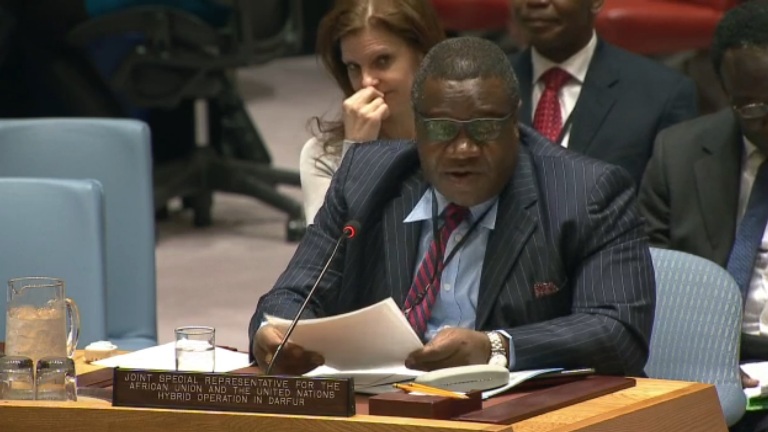16,000 people displaced from Jebel Marra since September: UNAMID

December 2018 (KHARTOUM) – The hybrid peacekeeping mission in Darfur (UNAMID) chief, Jeremiah Mamabolo, on Sunday said thousands of people have been displaced due to continued clashes between government forces and armed groups in Darfur.
Speaking at a press conference in Khartoum on Sunday, Mamabolo said 16,000 people have been displaced to camps in the various localities of Jebel Marra in south and central Darfur since September.
He pointed out that repeated skirmishes between armed groups and government forces have adversely impacted on civilians in Jebel Marra area.
Although the UNAMID chief has refrained from naming a specific armed group involved in these skirmishes, the Sudan Liberation Movement (SLM-AW) led by Abdel-Wahid al-Nur continued to report that its fighters have clashed with the government militia Rapid Support Forces (RSF) in a number of areas around Jebel Marra during the recent weeks.
Mamabolo added that two Darfur groups, the Justice and Equality Movement (JEM) and Sudan Liberation Movement (SLM-MM) led by Minni Minnawi would meet with the government from 6 to 7 December in Berlin.
He said the African mediation hopes the two sides would sign a pre-negotiation agreement, saying if the Berlin meeting was successful, the parties would hold a second meeting in Doha to discuss the substantive issues.
The UNAMID chief vowed to continue his support to the efforts exerted by the African Union High Implementation Panel (AUHIP) chief Thabo Mbeki to bring all parties to the negotiating table.
He pointed out that these efforts aim to arrive at comprehensive peace talks on the bases of the Doha Document for Peace in Darfur (DDPD).
Mamabolo further called on the non-signatories of the DDPD particularly the SLM-AW to join the “tremendous efforts” of the international community to achieve peace in Darfur.
The government and the armed groups in Darfur held several meetings in Berlin earlier this year to discuss a framework agreement (pre-negotiation agreement) before to engage in the peace talks.
The government had refused a demand made by the rebels to establish a new mechanism to implement the future peace agreement. However, Khartoum recently informed the German and U.S. facilitators they are no longer opposed to this mechanism.
After a recent meeting held in Addis Ababa on 22-23 November, the African Union’s Peace and Security Council (AUPSC) said the leaders of JEM and SLM-MM initialled the draft framework agreement for the peace talks.
The Sudanese army has been fighting the Sudan People’s Liberation Movement (SPLM-N) rebels in the Blue Nile and South Kordofan since 2011 and a number of armed movements in Darfur since 2003.
The AUHIP is brokering comprehensive peace talks to end the war and achieve democratic reforms. The two-track process comprises the Sudanese government and opposition forces including the armed groups in Darfur and the Two Areas.
UNAMID EXIT STRATEGY
Meanwhile, Mamabolo announced that the UNAMID headquarters would move from the capital of North Darfur State, El-Fasher to Khartoum as part of the Mission’s exit strategy.
He pointed out that UNAMID has so far handed over 8 sites to the Sudanese government, saying the Mission will withdraw from two more sites before the end of December.
A tripartite working group including the Sudanese government, African Union (AU) and the United Nations (UN) has been set up in February 2015 to develop an exit strategy for the UNAMID from Darfur.
In June 2017, the AU and the UN decided to draw down the UNAMID by withdrawing the military personnel by 44% and that of the police component by 30%, the closure of 11 team sites in the first phase and the withdrawal of the military component from another 7 team sites in the second phase.
The UN Security Council (UNSC) admitted that the security situation in Darfur has improved but it decided to reinforce its presence in the mountainous area of Jebel Marra because there is no cessation of hostilities as a Sudan Liberation Movement faction led by Abdel Wahid al-Nur (SLM-AW) refuses to declare a unilateral truce or to engage in peace negotiations.
Last July, the UNSC unanimously decided to extend for one year the mandate of the UNAMID and also to reduce the number of its troops in line with an exit strategy aiming to close the hybrid operation in two years.
The hybrid mission has been deployed in Darfur since December 2007 with a mandate to stem violence against civilians in western Sudan’s region.
It is the world’s second-largest international peacekeeping force with an annual budget of $1.35 billion and almost 20,000 troops. UN agencies estimate that over 300,000 people were killed in the Darfur conflict since 2003, and over 2.5 million are displaced.
(ST)
